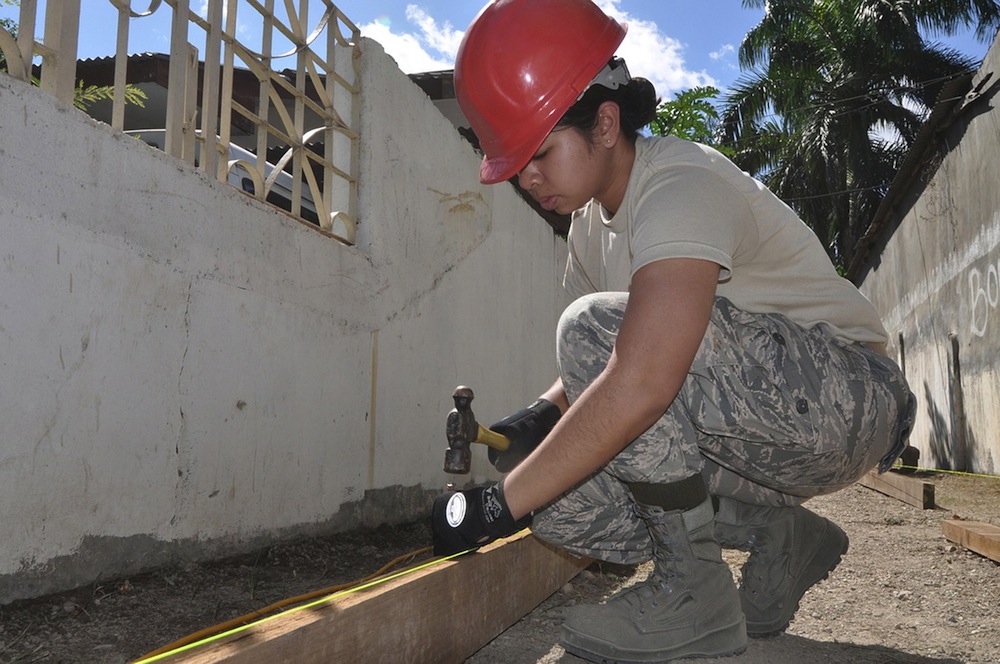Women account for nearly 47% of America’s workforce, according to the Bureau of Labor Statistics. But they represent less than 9% of all construction workers.
One of the women in the field is Doreen DiPolito, the 48-year-old president and owner of D-Mar General Contractors in Clearwater, Fla., where she’s been working since 2001. DiPolito has four women workers out of the 15 to 25 people she employs, depending on the time of year. And she’s been having trouble finding HVAC subs.
At a time when a recovering construction industry is facing shortages in many trades, DiPolito is on a mission to encourage women to at least consider construction as a career.
“When a big contract comes to town, I shouldn’t have to partner with one of the large contracting companies in order to get a piece of the set-aside work. But that’s how it still is, and I don’t think that’s right.” —Doreen DiPolito
“With the economic turnaround in Florida and other parts of the country, women owe it to themselves to explore construction career, which offer better earning and advancement potential than many lower-paid, traditionally female-dominated jobs,” she tells BD+C.
Her own experience tells her that women are capable of doing any construction work. A single parent of three, including a special-needs child, DiPolito started out as a mechanical engineer with Honeywell. She joined D-Mar to help out her former mother-in-law when her husband, D-Mar’s owner, died. In 2006, DiPolito earned her Florida General Contractor certificate.
She concedes that construction is not a profession that kids are pushed toward. So her solutions to the industry’s labor shortage problem includes educating girls in middle and high school about alternative career options. She would also like to see vocational and technical schools expand their outreach and access to women students.
However, the biggest obstacle to more women entering the construction field may be the reluctance of parents or counselors to recommend that field. “Construction has gotten a bad rap. But what happens in this country if these skills, like masonry or electrical, disappear?”
DiPolito has put herself forward on this topic because of what she sees as the industry’s systemic gender discrimination, which she says she’s experienced first hand. “When a big contract comes to town, I shouldn’t have to partner with one of the large contracting companies in order to get a piece of the set-aside work. But that’s how it still is, and I don’t think that’s right.”
DiPolito is realistic about the chances that her advocacy is going to result in any immediate changes in the industry’s hiring practices. But she’s taking the longer view in her hope that any influence she might wield will alter the perspective of younger generations about construction.
And she’s not acting in isolation, either. About a year ago, Ashley Schmidt, a business development manager for SmithGroupJJR in Washington D.C., formed a committee to create The Women in Healthcare group, for the purpose of promoting the development of AEC females in the healthcare sector through mentoring and sharing successful techniques, leads, contacts, products, and services.
The group, which covers the Delaware/Maryland/Virginia area, now has a board of directors, and has grown to more than 200 members, according to Brenna Costello, AIA, EDAC, a Principal at SmithGroupJJR. Among the group’s functions are networking and educational events such as the one scheduled for September 17 at Holy Cross Hospital in Germantown, Md., a $202 million facility that opened in 2014. Annice Cody, president of Holy Cross Health Network, and Lora Schwartz, Principal Consultant for CBRE Healthcare, are scheduled to speak about strategic planning and forecasting methodologies.
“The role of our group is to expand and empower,” says Costello, noting that more than 50% of undergraduate degrees are now earned by women.
Related Stories
| Nov 10, 2010
$700 million plan to restore the National Mall
The National Mall—known as America’s front yard—is being targeted for a massive rehab and restoration that could cost as much as $700 million (it’s estimated that the Mall has $400 million in deferred maintenance alone). A few of the proposed projects: refurbishing the Grant Memorial, replacing the Capitol Reflecting Pool with a smaller pool or fountain, reconstructing the Constitution Gardens lake and constructing a multipurpose visitor center, and replacing the Sylvan Theater near the Washington Monument with a new multipurpose facility.
| Nov 9, 2010
Just how green is that college campus?
The College Sustainability Report Card 2011 evaluated colleges and universities in the U.S. and Canada with the 300 largest endowments—plus 22 others that asked to be included in the GreenReportCard.org study—on nine categories, including climate change, energy use, green building, and investment priorities. More than half (56%) earned a B or better, but 6% got a D. Can you guess which is the greenest of these: UC San Diego, Dickinson College, University of Calgary, and Dartmouth? Hint: The Red Devil has turned green.
| Nov 9, 2010
12 incredible objects being made with 3D printers today
BD+C has reported on how 3D printers are attracting the attention of AEC firms. Now you can see how other creative types are utilizing this fascinating printing technology. Among the printed items: King Tut’s remains, designer shoes, and the world’s smallest Rubik’s Cube.
| Nov 9, 2010
U.S. Army steps up requirements for greening building
Cool roofs, solar water heating, and advanced metering are among energy-efficiency elements that will have to be used in new permanent Army buildings in the U.S. and abroad starting in FY 2013. Designs for new construction and major renovations will incorporate sustainable design and development principles contained in ASHRAE 189.1.
| Nov 9, 2010
Designing a library? Don’t focus on books
How do you design a library when print books are no longer its core business? Turn them into massive study halls. That’s what designers did at the University of Amsterdam, where they transformed the existing 27,000-sf library into a study center—without any visible books. About 2,000 students visit the facility daily and encounter workspaces instead of stacks.
| Nov 9, 2010
Turner Construction report: Green buildings still on the agenda
Green buildings continue to be on the agenda for real estate owners, developers, and corporate owner-occupants, according to the Turner 2010 Green Building Market Barometer. Key findings: Almost 90% of respondents said it was extremely or very likely they would incorporate energy-efficiency improvements in their new construction or renovation project, and 60% expected to incorporate improvements to water efficiency, indoor environmental quality, and green materials.
| Nov 5, 2010
New Millennium’s Gary Heasley on BIM, LEED, and the nonresidential market
Gary Heasley, president of New Millennium Building Systems, Fort Wayne, Ind., and EVP of its parent company, Steel Dynamics, Inc., tells BD+C’s Robert Cassidy about the Steel Joist Manufacturer’s westward expansion, its push to create BIM tools for its products, LEED, and the outlook for the nonresidential construction market.
| Nov 3, 2010
First of three green labs opens at Iowa State University
Designed by ZGF Architects, in association with OPN Architects, the Biorenewable Research Laboratory on the Ames campus of Iowa State University is the first of three projects completed as part of the school’s Biorenewables Complex. The 71,800-sf LEED Gold project is one of three wings that will make up the 210,000-sf complex.
| Nov 3, 2010
Park’s green education center a lesson in sustainability
The new Cantigny Outdoor Education Center, located within the 500-acre Cantigny Park in Wheaton, Ill., earned LEED Silver. Designed by DLA Architects, the 3,100-sf multipurpose center will serve patrons of the park’s golf courses, museums, and display garden, one of the largest such gardens in the Midwest.
| Nov 3, 2010
Public works complex gets eco-friendly addition
The renovation and expansion of the public works operations facility in Wilmette, Ill., including a 5,000-sf addition that houses administrative and engineering offices, locker rooms, and a lunch room/meeting room, is seeking LEED Gold certification.














